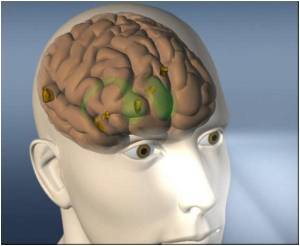Hypertension (high blood pressure) and other known risk factors for stroke are found to increase the risk of developing cognitive problems, shows study.

The new findings come from the REasons for Geographic and Racial Differences in Stroke (REGARDS) study, an effort to track stroke risk and cognitive health in an ethnically and demographically diverse sample of the U.S. population 45 and older. Since 2003, the study has followed more than 30,000 people. The study is funded by NIH's National Institute of Neurological Disorders and Stroke (NINDS) and is led by George Howard, Ph.D., chair of the biostatistics department at the University of Alabama at Birmingham.
Strokes, which affect some 795,000 Americans each year, occur when blood vessels that supply the brain rupture or become blocked. A stroke can cause a host of cognitive disabilities, including effects on memory, speech and language, and everyday problem solving. But even without suffering a stroke, individuals at risk for stroke may experience cognitive problems as their blood vessels deteriorate.
For this analysis, the REGARDS team collected data on nearly 24,000 study participants who had no history of cognitive impairment or stroke, and no evidence of stroke during the study. At the start, the researchers assessed each person's stroke risk with the Framingham Stroke Risk Profile, which incorporates risk factors including age, high blood pressure, diabetes and heart problems. They also assessed cognitive health with a six-item screening test that required participants to give the year, month and day, and to remember three items from a list after a short delay. The test was repeated annually, and the average follow-up time was 4.1 years.
"A strength of this study is that it looked at people who were cognitively healthy at the start and reassessed their cognitive function periodically to see who developed problems over time," said NINDS Deputy Director Walter Koroshetz, M.D. "This allowed the investigators to explore whether certain risk factors were predictive of, rather than just correlated with, cognitive impairment."
Over the course of the study, 1,907 people without an evident stroke showed cognitive impairment, which was significantly associated with their baseline Framingham score. In this group, age and left ventricular hypertrophy (LVH), an enlargement of the heart, were the only score components that independently predicted cognitive decline. Similar to the risk of stroke, each 10-year increment in age doubled the risk of cognitive impairment. LVH, when adjusted for other factors, increased the risk by about 30 percent.
Advertisement
Consistent with a prior report from REGARDS, demographic risk factors for stroke were also risk factors for cognitive decline. Men, African-Americans of both sexes, and residents of the Stroke Belt (Alabama, Arkansas, Georgia, Louisiana, Mississippi, North Carolina, South Carolina and Tennessee) had a higher risk of cognitive decline. Education was also a factor, with the risk of cognitive decline decreasing as education increased.
Advertisement
Source-Eurekalert















